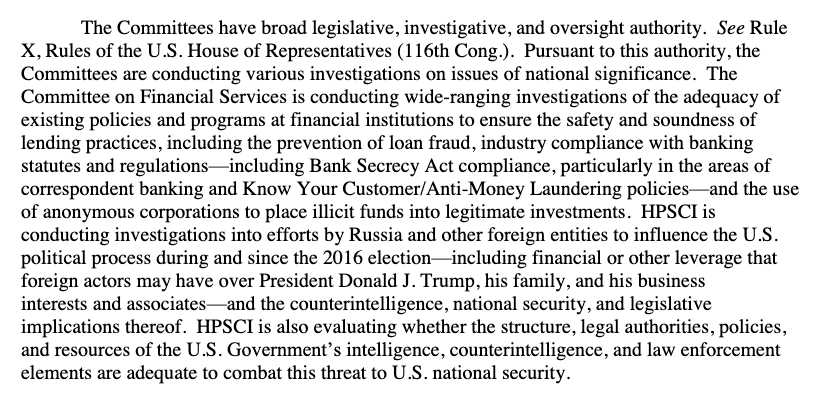Chief Justice Roberts announces Trump v. Mazars, and we're about to begin.
Trump's attorney Patrick Strawbridge says it's "difficult to imagine" a situation where that would be justified.
c-span.org/video/?471675-…
Justice Ginsburg notes that every prior president has disclosed his tax returns.
"President Trump is the first one to refuse to do that," she notes.
She asks how Strawbridge distinguishes this case from Watergate, Whitewater, and others.
"What's the difference between a legislative subpoena and an impeachment subpoena?"
Strawbridge says that the committees behind the subpoenas do not have jurisdiction over impeachment.
"I see a tremendous separation of powers problem" in Strawbridge's position of placing a heightened standard, Sotomayor says.
Justice Kagan adds that Strawbridge is asking SCOTUS to "put a ten-ton weight on the scales between the president and Congress."
Kagan counters: "I think some former presidents might contest the idea that these subpoenas go further than has ever gone before."
(Context from me: One of those needs, the House has argued before, is studying whether financial institutions are complying with anti-money laundering statutes.) courthousenews.com/wp-content/upl…

Wall claims that the subpoenas on their face show they do not support those intentions.
Analogizing it to a policeman on the beat, the courts don't allow speculating on the motive for stopping a car.
"Here, you're distrusting Congress more than the cop on the beat."
I am listening in and tweeting periodically from New York as an interested journalist who covered the case in SDNY.
She asks why would investigating his financial relationships leading up to the presidency would not be fair game.
Kagan presses on the Clinton v. Jones standard, which rejected the notion of presidential immunity.
"I'll grant, that subpoena looks very much like this one."
"We want records from third-party business entities, their analyzes of requests for loans."
They include documents Trump has never even seen, he says.
Roberts asks whether there is any probe that can't conceivably be tied to legislation.
"Your test is not really much of a test," Roberts says. "It's not a limitation."
"This court's power of judicial review, that's nowhere mentioned in the Constitution," Letter says, referring to SCOTUS.
Letter: "Two answers, your honor." He then cites two SCOTUS precedents.
McGrain v. Dougherty and Clinton v. Jones.
The Clinton precedent established presidents are not immune for conduct prior to office.
Letter's arguing that courts established the guardrails. It's not limitless.
If it's the courts, Alito says: "That's why we're here."
Letter notes the four courts below all found there was valid legislative purpose.
Alito says that Letter was not able to provide Justice Roberts with an example of a subpoena that could not be tied to a legislative purpose.
It's two banks and an accounting firm, Letter says, referring to Deutsche, Capitol One and Mazars.
Pardon the typo.
Letter responds that they would almost always not be pertinent to a congressional investigation, except perhaps under a 25th Amendment context.
Letters emphasizes again, in response, that nothing is required of the president or the White House in response to the subpoenas to private entities.
"There may be burdens here, third party or not."
Breyer says he's concerned about such searches in the hands of a future Senator McCarthy.
Deutsche Bank and Capital One have both been sanctioned millions for violating anti-money laundering provisions.
Separate arguments over Manhattan DA Cyrus Vance's similar subpoenas are up ahead. Look out for my colleague @ByTimRyan's coverage on @CourthouseNews. c-span.org/video/?471675-…
Sekulow:
Clinton v. Jones was in federal court; this is in state court.
Clinton v. Jones was a civil case; this is a criminal probe.
Sekulow: Certainly not here.
Sekulow replies that the president should not be treated as an ordinary citizen, as he is his own branch of government, and it's a temporary immunity.
Sekulow warned that the Vance case could open floodgates to county prosecutors across the country, but Breyer notes the same is true--if not more so--of civil litigation.
She says she finds it "odd" that he wants SCOTUS to rule there is an immunity against prosecutor probes, but not civil litigation.
The solicitor general Noel Francisco, representing the United States, is arguing for a "special needs" standards.
Roberts asks what's wrong with Trump's position.
Francisco demurs, saying he's not criticizing Trump's position but there's no need for his office to get into absolute immunity questions because, he said, special need isn't shown.
She says that the government seems to argue that they make the "backwards" decision of making charging decision prior to the probe.
He says the investigation was sparked from the suspicion that "certain business transactions within our jurisdiction were illegal."
"The supposed floodgates have been open for generations, and there never was a flood."
Manhattan DA's counsel mocks the "parade of horribles" fears and "apocalyptic" visions.
New York does because Trump Org is headquartered here.
Manhattan DA's counsel says that he is not aware of other states have lax grand jury secrecy rules, but he adds that New York's are as stringent as federal rules.
Dunne: They ask all the time, your honor, and the answer is consistently no.


